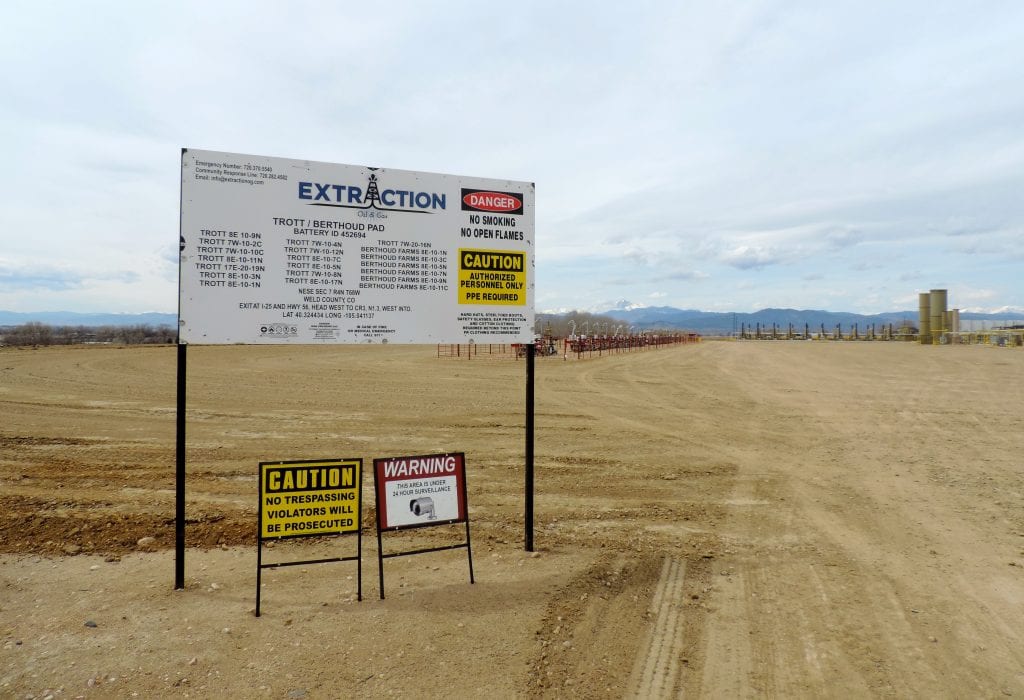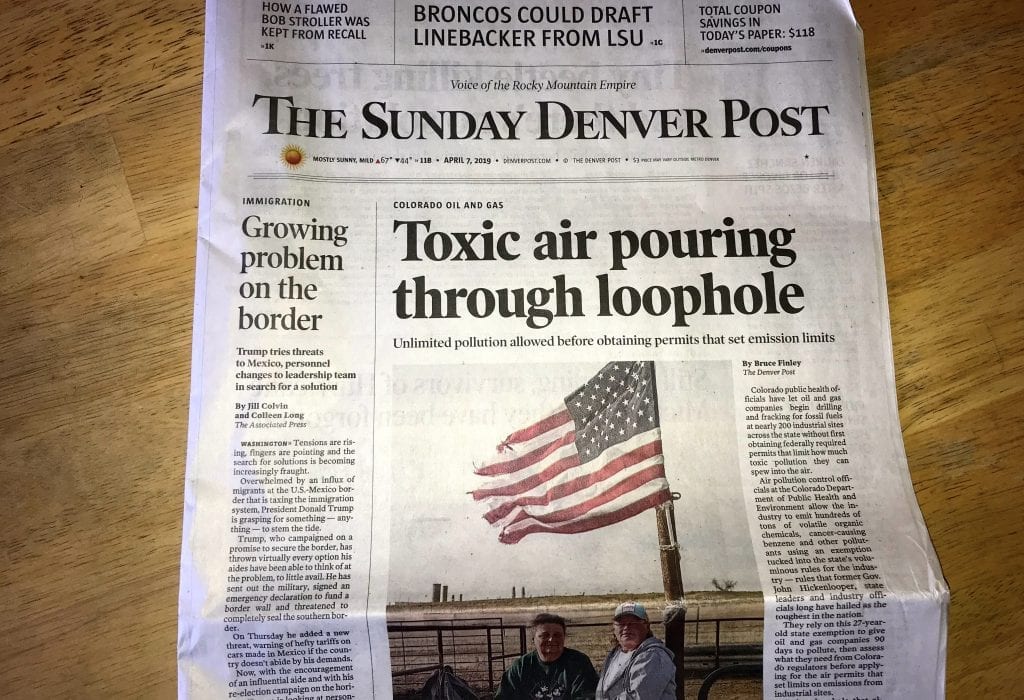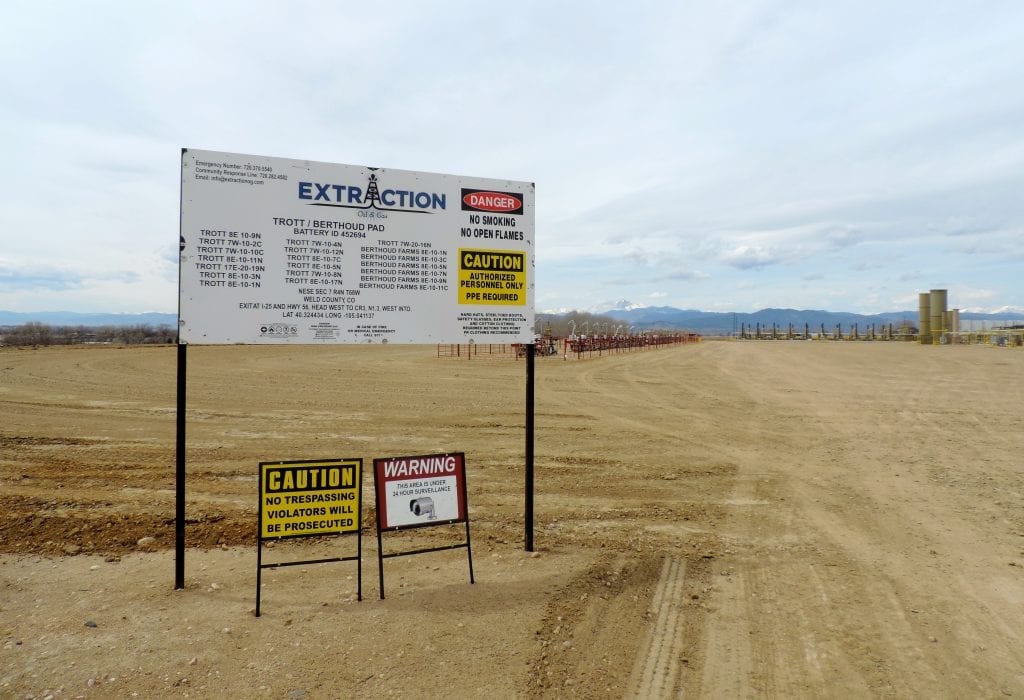
Despite a Denver Post exposé and worsening smog pollution in the Denver Metro Area, the oil and gas industry continues to frack in Colorado before obtaining legally required air pollution permits.
And while WildEarth Guardians is pushing back to put an end to this illegal practice, sadly, state air regulators are continuing to turn their backs on the problem, letting the fracking industry trounce Colorado’s clean air.
Worse, they’re turning their backs on the problem even as Colorado Governor Jared Polis is calling for tighter regulation of oil and gas companies and “aggressively” moving forward to curtail smog in the Denver Metro Area.
The 90-day Loophole
In case you missed the news last April, oil and gas companies are abusing a regulatory loophole in Colorado, constructing and operating massive production facilities before obtaining permits that actually limit harmful emissions.
Referred to as the “90-day loophole,” Colorado’s regulations actually allow companies to avoid submitting applications for legally required air pollution permits at oil and gas well sites for up to 90 days after beginning production.
The loophole effectively allows companies to avoid obtaining permits for months, sometimes even years, after drilling wells, fracking, and beginning to produce oil and gas.
As the Denver Post reported, hundreds of oil and gas well facilities are now operating in Colorado without permits. With no permits, there’s no assurance that companies are controlling their toxic emissions.
For people and communities near these oil and gas well sites, no permits means no ability to ensure companies are limiting harmful pollution. That means no ability to ensure companies are fully protecting public health and the environment.
In the words of Berthoud, Colorado resident Stephanie Nilsen, who lives next to Extraction Oil and Gas’s Trott facility, which is currently producing oil and gas from 18 wells without a permit, “It is just unfair. Air quality? They screwed me.”
Industry Abusing Loophole
The thing is, while there is a loophole in Colorado’s air quality regulations, it only applies to small sources of emissions.
In the Denver Metro Area, which is designated a “nonattainment area” because of violations of federal health limits on ground-level ozone (i.e., the key ingredient of smog), a small source is any facility with the potential to release less than 100 tons of smog forming volatile organic compound emissions.
If an oil and gas production facility has the potential to release more than 100 tons of volatile organic compounds, then that source is considered a “major source” and subject to stringent permitting requirements.
A major source permit requires companies meet very stringent emission limits, offset emissions to achieve a net reduction in pollution, and comply with other strict provisions. Put another way, a major source permit ensures companies achieve the highest level of clean air protection.
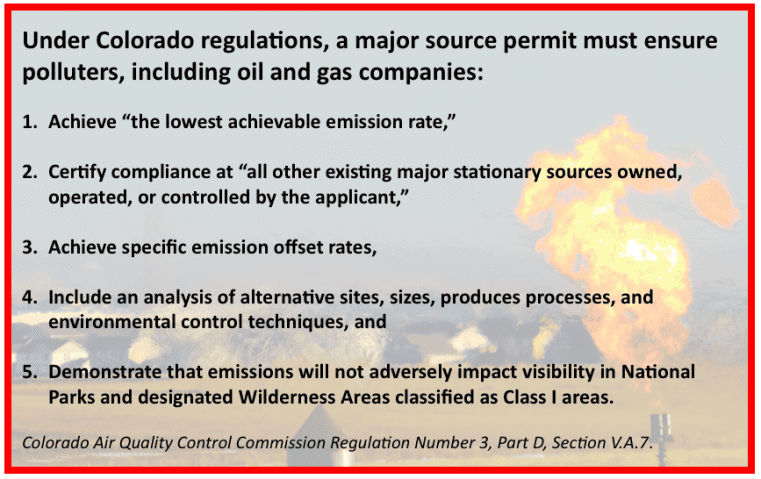
More importantly, if an oil and gas production facility is a major source, Colorado’s regulations don’t allow companies to use the 90-day loophole. Instead, if a facility is a major source, companies must obtain a major source permit before even beginning construction.
Unfortunately, oil and gas companies in Colorado have acted as if the 90-day loophole is a free pass to pollute for any production facility, no matter the level of emissions.
Even as fracking has boomed in the Denver Metro Area and pushed ground-level ozone to dangerous highs, industry asserts major sources of emissions don’t have to obtain permits before beginning construction and production.
They’ve gone so far as to argue the 90-day loophole provides an absolute exemption to major source permitting.
Colorado Regulator Complicity
Industry’s arguments are flat out wrong. Unfortunately, regulators with the Colorado Air Pollution Control Division have refused to push back and have even gone along with industry’s abuse of the 90-day loophole.
Over the years, they’ve looked the other way and allowed hundreds of oil and gas production facilities that are major sources of air pollution to avoid obtaining major source permits.
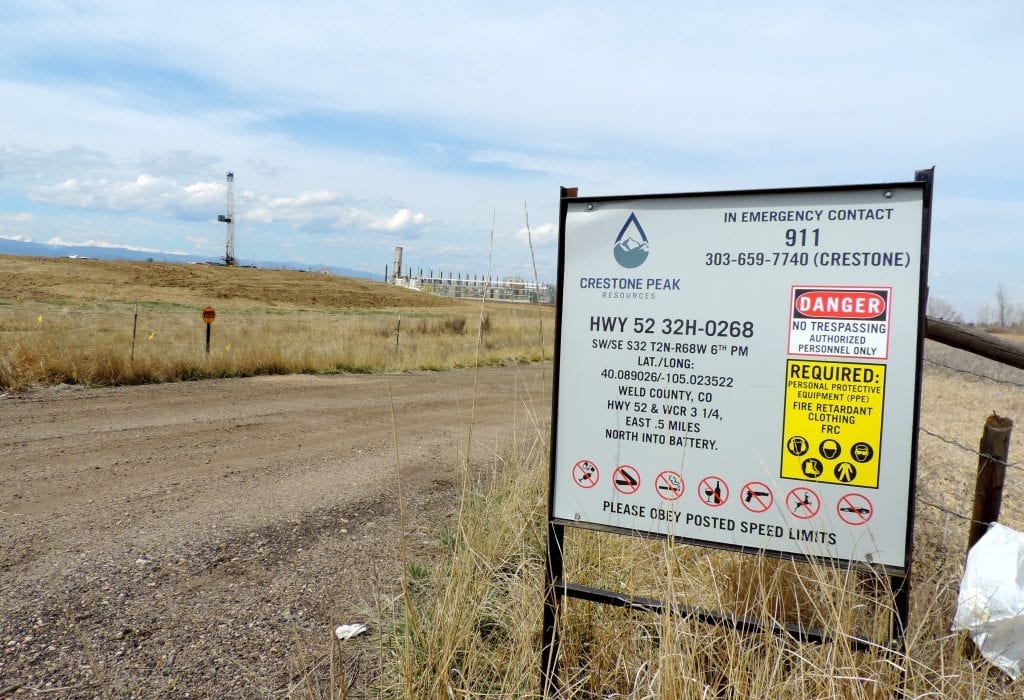
This Crestone Peak oil and gas well production facility near Erie, Colorado is currently operating without legally required air pollution permits.
In doing so, they’ve foreclosed opportunities to reduce emissions and hold the fracking industry accountable to the best clean air standards.
Even in the Denver Metro Area, where emission cuts are critical for curbing the region’s smog, the Air Division has refused to enforce major source permitting requirements when it comes to fracking.
Coupled with ineffective regulations and seeming collusion with the oil and gas industry, it’s no wonder the region’s pollution woes are only worsening. This past spring, the American Lung Association reported that Denver’s ground-level ozone pollution is on the rise.
Ozone especially harms children, older adults and those with asthma and other lung diseases. When older adults or children with asthma breathe ozone-polluted air, too often they end up in the doctor’s office, the hospital or the emergency room.
– JoAnna Strother, Director of Advocacy, American Lung Association in Colorado
And even though earlier this year, the Air Pollution Control Division indicated it planned to investigate “if the (state’s) regulatory structure complies with the technical requirements of the Clean Air Act,” there’s seemingly been no changes to date.
In fact, the Air Division appears to be moving more aggressively than ever to let the oil and gas industry off the hook when it comes to major source permitting.
Right now, the Division is proposing to approve around 30 new air pollution permits for oil and gas production facilities that would let companies avoid major source permitting. Most of these facilities are located in the Denver Metro Area.
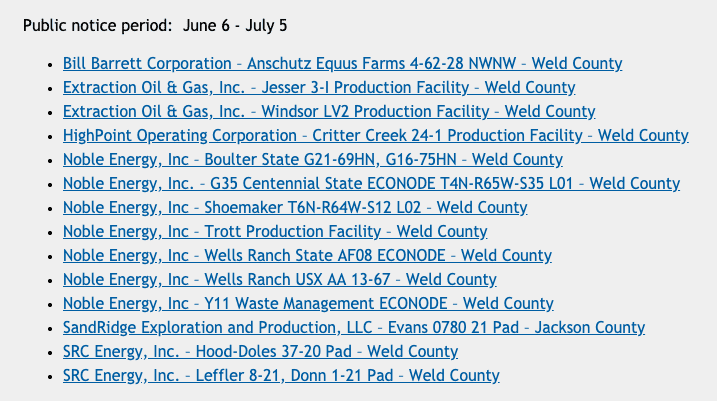
Just some of the air pollution permits proposed for approval by the Colorado Air Pollution Control Division that would allow oil and gas companies avoid major source permitting.
Under the proposed permits, companies like Noble Energy and Extraction Oil and Gas would be allowed to avoid major source permitting, even though the companies have already built major sources and started producing oil and gas.
WildEarth Guardians has opposed the Air Division’s proposed permits. In comments submitted last Friday, we objected to permits allowing Extraction Oil and Gas, Noble Energy, SRC Energy, and other companies to avoid major source permitting requirements.
That the Division has proposed to approve these permits seems a clear indication that industry’s abuse of the 90-day loophole remains condoned by regulators.
New Hope or Business as Usual?
To be certain, Colorado Governor Jared Polis has ushered in a new era of oil and gas regulation that prioritizes public health and the environment. In April, he signed Senate Bill 19-181 into law, which directs Colorado air regulators to adopt new rules limiting harmful emissions from fracking operations.
However, the Air Pollution Control Division seems to be moving slowly and uncertainly, at best, to meet Senate Bill 181’s mandate.
It was only last Friday, July 5, that the Air Division announced its first public meeting regarding a “Potential Fall 2019 Air Quality Rulemaking.”
That meeting isn’t scheduled to take place until July 29. And while the Division is asking for public comment, it’s unclear exactly what the public is commenting on at this point.
In May, WildEarth Guardians, together with partners at Colorado Rising, 350 Colorado, and Mothers Out Front, submitted concrete expectations for new rules under Senate Bill 181.
Among other things, we called on the Division to eliminate the 90-day loophole, adopt an aggressive oil and gas industry emission offset program, and hold fracking companies accountable to the most stringent of air pollution controls. We have yet to receive a response to this letter.
However, given the lack of substance and clarity so far around the process, there’s reason to be concerned the Air Division may not be on track to meet these basic expectations.
Most importantly, with the Division continuing allowing oil and gas companies to avoid major source permitting, there’s reason to be concerned clean air is taking a backseat to the fracking industry in Colorado.
In the Denver Metro Area, we estimate there are currently over 50 fracking facilities operating without legally required major source permits.
The map below shows where these facilities are located. The bigger the circle, the higher the level of volatile organic compound emissions. Zoom in or click to see a larger version of the map to learn more.
In spite of this, the Air Division is letting the companies behind these facilities avoid major source permitting.
Instead, they’re obtaining weaker permits that don’t ensure stringent pollution controls, don’t offset emissions, and don’t achieve the high level of clean air protection required for major sources.
For the Denver Metro Area, this means more smog pollution and more danger to public health. This certainly is not the “aggressive” clean air action that Governor Polis intended.
We Need a Change
As part of our Colorado Front Range Oil and Gas Clean Air Enforcement Initiative, we’re taking aim at industry’s illegal abuse of the 90-day loophole.
In a Clean Air Act citizen enforcement lawsuit filed in May, we targeted seven companies, including Extraction Oil and Gas, Noble Energy, Crestone Peak Resources, and others for violating Colorado clean air laws by failing to obtain legally required major source permits.
This federal case is unprecedented in the American West. Never before has a citizen suit been filed against the oil and gas industry in this region. However, never before have we faced such a widespread failure of the fracking industry to comply with our clean air laws.
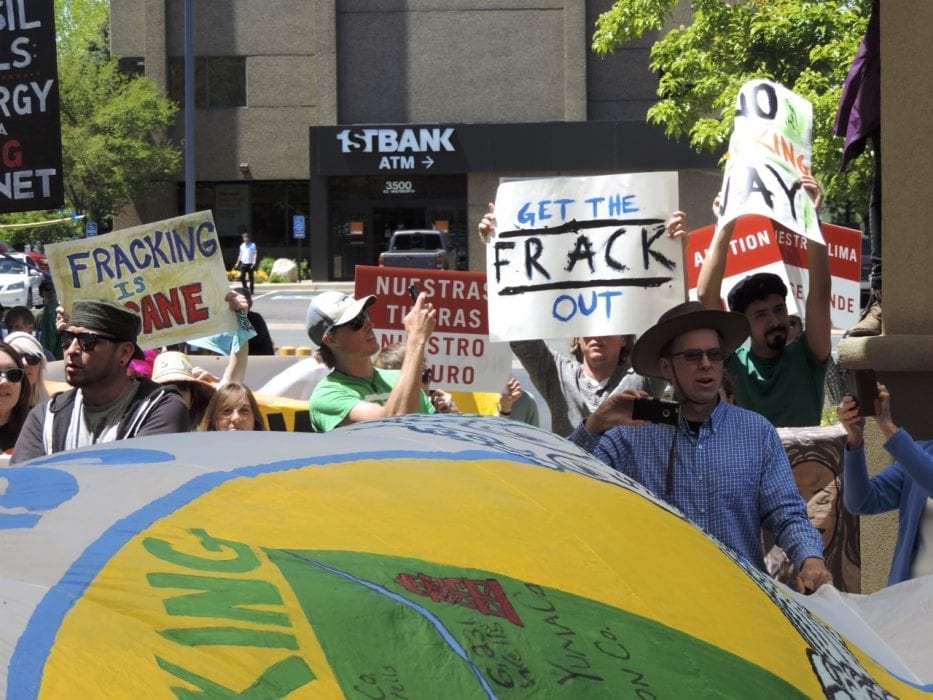
While our legal case promises to secure the accountability we need for our clean air and health, the reality is, we need Colorado regulators on board with safeguarding air quality in Denver and beyond.
We know the Governor genuinely wants to see clean air restored in Colorado. Citing “outrage” over delay, earlier this year, he stepped up to keep the Denver Metro Area’s smog clean up on track. In statements, he’s made abundantly clear his support for bold action to reduce air pollution and protect public health.
We have to do everything in our power right here at home to make our air cleaner and our people healthier as soon as we possibly can.
– Colorado Governor Jared Polis
With the Colorado Air Pollution Control Division continuing to let industry abuse the 90-day loophole, it’s urgent the Governor step up to set things right.
That’s why we’ve reached out to our members and supporters to stand with us in calling on Governor Polis to ensure clean air and health comes first in Colorado. Hundreds of Coloradans have so far signed the petition, which we intend to deliver to the Governor next week.
But the Governor also needs to hear directly from Coloradans. Call him or send an e-mail today, click here for contact information >>
So long as the oil and gas industry is allowed to abuse the 90-day loophole and pollute without permits, clean air and public health will suffer in Colorado. It’s up to the Governor to change this and give Coloradans the breath of fresh air they deserve.
